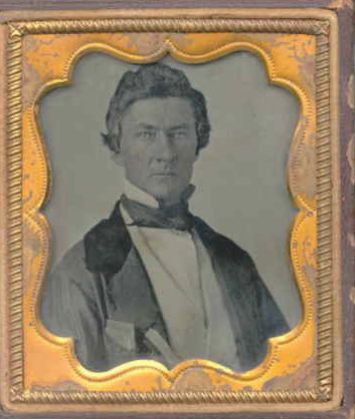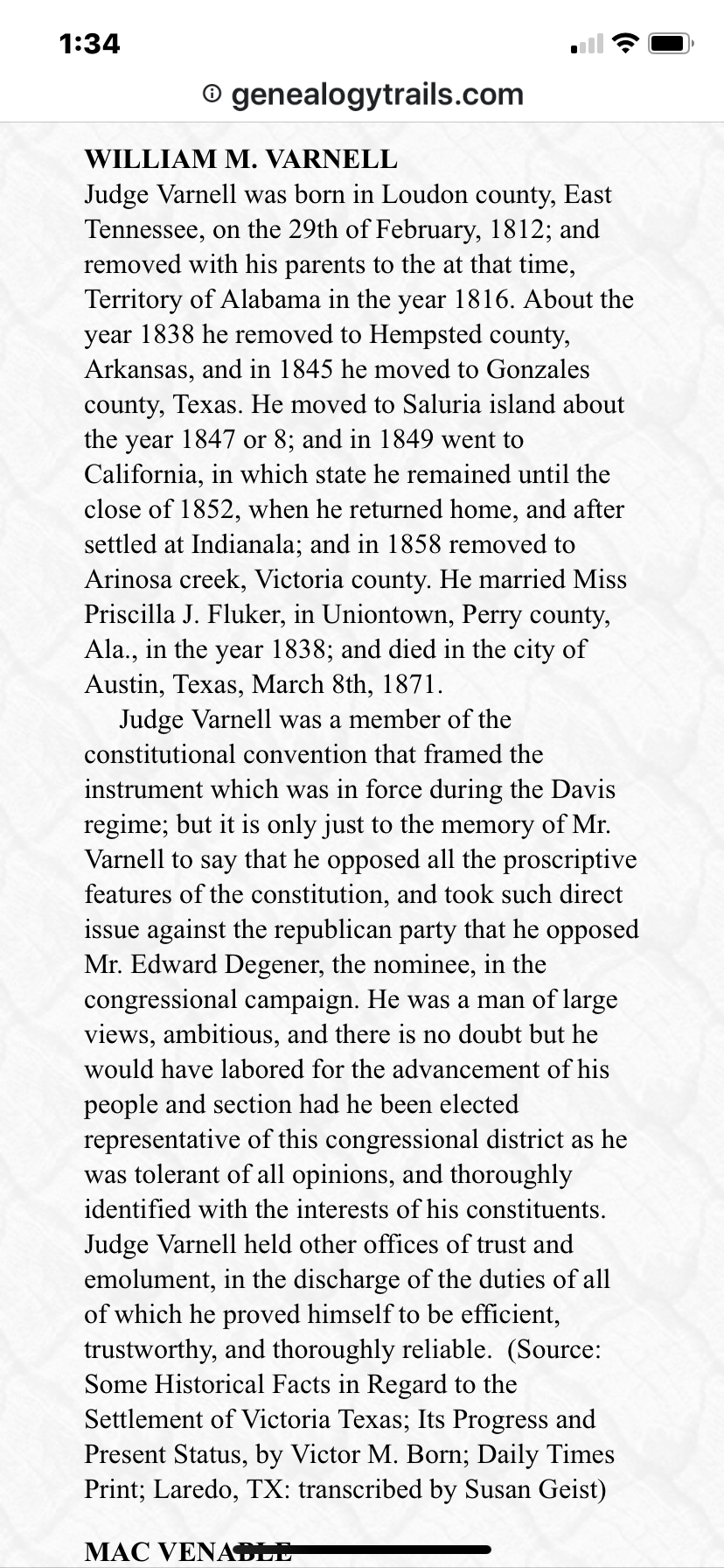(1812~1871)
William M. Varnell, member of the Texas Constitutional Conventions of 1866 and 1868-69, was born in Loudon County,
Tennessee on February 29, 1812, to Joseph and Mary Varnell. Often referred to as "Judge," Varnell was elected on January 8, 1866, as a delegate to the 1866 Constitutional Convention that convened in Austin on February 7. Representing Calhoun, Victoria, Jackson and DeWitt Counties, he traveled to Austin, where he and the other delegates spent only 55 days creating a new constitution to send to the voters.
In February, 1868, Varnell was once again elected as a delegate from Calhoun, Victoria, Jackson, and DeWitt Counties to another Constitutional Convention. He was one of six delegates to serve in both conventions. The 1868-69 Constitutional Convention, no where near as proficient as the 1866 Convention, was marred by political maneuvering and partisan fighting. Lasting only 150 days, the delegates did not complete a constitution, and spent over $200,000.
Disgusted with the Convention, the resulting Constitution, and the Republican Party and leadership, Varnell decided to run for the Congress. His opponent was Edward Degener, a German-born Republican.
Unsuccessful in his bid, Varnell returned to Calhoun County, where he was elected Inspector of Cattle and Hides. He took his oath of office on November 3, 1870. While in Austin, Judge Varnell died of Typhoid Fever on March 9, 1871, and was buried in the Texas State Cemetery.
Source: http://www.cemetery.state.tx.us/pub/user_form22.asp
Suggested edit: WILLIAM M. VARNELL
Judge Varnell was born in Loudon county, East Tennessee, on the 29th of February, 1812; and removed with his parents to the at that time, Territory of Alabama in the year 1816. About the year 1838 he removed to Hempsted county, Arkansas, and in 1845 he moved to Gonzales county, Texas. He moved to Saluria island about the year 1847 or 8; and in 1849 went to California, in which state he remained until the close of 1852, when he returned home, and after settled at Indianala; and in 1858 removed to Arinosa creek, Victoria county. He married Miss Priscilla J. Fluker, in Uniontown, Perry county, Ala., in the year 1838; and died in the city of Austin, Texas, March 8th, 1871.
Judge Varnell was a member of the constitutional convention that framed the instrument which was in force during the Davis regime; but it is only just to the memory of Mr. Varnell to say that he opposed all the proscriptive features of the constitution, and took such direct issue against the republican party that he opposed Mr. Edward Degener, the nominee, in the congressional campaign. He was a man of large views, ambitious, and there is no doubt but he would have labored for the advancement of his people and section had he been elected representative of this congressional district as he was tolerant of all opinions, and thoroughly identified with the interests of his constituents. Judge Varnell held other offices of trust and emolument, in the discharge of the duties of all of which he proved himself to be efficient, trustworthy, and thoroughly reliable. (Source: Some Historical Facts in Regard to the Settlement of Victoria Texas; Its Progress and Present Status, by Victor M. Born; Daily Times Print; Laredo, TX: Contributor: Sherry (47010546)
(1812~1871)
William M. Varnell, member of the Texas Constitutional Conventions of 1866 and 1868-69, was born in Loudon County,
Tennessee on February 29, 1812, to Joseph and Mary Varnell. Often referred to as "Judge," Varnell was elected on January 8, 1866, as a delegate to the 1866 Constitutional Convention that convened in Austin on February 7. Representing Calhoun, Victoria, Jackson and DeWitt Counties, he traveled to Austin, where he and the other delegates spent only 55 days creating a new constitution to send to the voters.
In February, 1868, Varnell was once again elected as a delegate from Calhoun, Victoria, Jackson, and DeWitt Counties to another Constitutional Convention. He was one of six delegates to serve in both conventions. The 1868-69 Constitutional Convention, no where near as proficient as the 1866 Convention, was marred by political maneuvering and partisan fighting. Lasting only 150 days, the delegates did not complete a constitution, and spent over $200,000.
Disgusted with the Convention, the resulting Constitution, and the Republican Party and leadership, Varnell decided to run for the Congress. His opponent was Edward Degener, a German-born Republican.
Unsuccessful in his bid, Varnell returned to Calhoun County, where he was elected Inspector of Cattle and Hides. He took his oath of office on November 3, 1870. While in Austin, Judge Varnell died of Typhoid Fever on March 9, 1871, and was buried in the Texas State Cemetery.
Source: http://www.cemetery.state.tx.us/pub/user_form22.asp
Suggested edit: WILLIAM M. VARNELL
Judge Varnell was born in Loudon county, East Tennessee, on the 29th of February, 1812; and removed with his parents to the at that time, Territory of Alabama in the year 1816. About the year 1838 he removed to Hempsted county, Arkansas, and in 1845 he moved to Gonzales county, Texas. He moved to Saluria island about the year 1847 or 8; and in 1849 went to California, in which state he remained until the close of 1852, when he returned home, and after settled at Indianala; and in 1858 removed to Arinosa creek, Victoria county. He married Miss Priscilla J. Fluker, in Uniontown, Perry county, Ala., in the year 1838; and died in the city of Austin, Texas, March 8th, 1871.
Judge Varnell was a member of the constitutional convention that framed the instrument which was in force during the Davis regime; but it is only just to the memory of Mr. Varnell to say that he opposed all the proscriptive features of the constitution, and took such direct issue against the republican party that he opposed Mr. Edward Degener, the nominee, in the congressional campaign. He was a man of large views, ambitious, and there is no doubt but he would have labored for the advancement of his people and section had he been elected representative of this congressional district as he was tolerant of all opinions, and thoroughly identified with the interests of his constituents. Judge Varnell held other offices of trust and emolument, in the discharge of the duties of all of which he proved himself to be efficient, trustworthy, and thoroughly reliable. (Source: Some Historical Facts in Regard to the Settlement of Victoria Texas; Its Progress and Present Status, by Victor M. Born; Daily Times Print; Laredo, TX: Contributor: Sherry (47010546)
Family Members
Advertisement
Explore more
Sponsored by Ancestry
Advertisement









